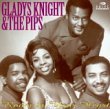|
The Gladys Knight Biography -
|
In a different house of soul, young Gladys belted at Atlanta church events. She then took her voice to the masses, winning a 1952 talent contest on Ted Mack's Original Amateur Hour.
That same year, when her brother "Bubba" (Merald) turned 10, he, she, their big sis Brenda, and Guest cousins William and Elenor formed a singing group. Another cousin, James "Pip" Woods, inspired both its name and its members' ambitions beyond family functions.
With Woods as manager, they won a two-week contract at the Royal Peacock Supper Club through a talent show. Soon, they were entertaining some less, uh, sheltered folks than themselves on the Chitlin' Circuit, swinging through black clubs in the Southeast.
In 1959, Brenda and Elenor left the group. Its average vocal pitch lowered with the addition of Langston George and cousin Edward Patten.
Around this time, Jackie Wilson and Sam Cooke unwittingly became part of Pips history as two of the R&B singers that those youngsters toured with!
(Click here for my review of Knight's self-penned life and music review.)
The Pips' first hit, "Every Beat of My Heart," doo-wopped up the charts in 1961. One problem: They hadn't known they were taping the song for real. They heard it on the radio--so to reword a later Pips line, woo hoo! But Vee Jay Records gave them no earnings--boo hoo!
 |
George departed in 1962, but the now-permanent quartet barely missed a step. It was so good at the Apollo that it cleansed the "boos" right out of the critical crowd.
It took one of Knight's several pregnancies in the early '60s to temporarily stall their progress. The Pips plugged on as backups here and there and managed some records of their own, like "Linda" and "Darling."
They reunited under their worldly new manager, Marghuerite Mays, who introduced them to Cholly Atkins. The Broadway-bred dance coach developed the group's exemplary stage moves, including struts, slides, and pirouettes. Earlier vocal guidance by Maurice King, a bigwig on Detroit's jazz/R&B scene, also paid off.
Berry Gordy liked what he saw and heard. Knight was less enthused about enlisting as a Motown song soldier. But in 1966, Gladys Knight and the Pips signed up (as had Maurice King and Cholly Atkins).
Norman Whitfield and Barrett Strong dotted the Pips/Gladys Knight discography with vigorous pieces like "Friendship Train" and "The End of Our Road." The group hit the big time with "I Heard It Through the Grapevine," originally slated for and later re-released by Marvin Gaye.

|
Although they had more experience than many Motowners, they wouldn't touch those stars until they joined Buddah in 1973.
The high from their last Motown hit, "Neither One of Us," carried over to the new label. Buddah offered them loads of creative freedom and promotion, and released enduring classics like the Grammy-winning "Midnight Train to Georgia" and "Best Thing That Ever Happened to Me." With the soundtrack Claudine, Gladys Knight and the Pips toed the film-music waters, too.
By the late 1970s, Gladys Knight's music had shifted into an ever-smoother soul vein. At Casablanca, the Pips recorded two separate albums, At Last...the Pips and Callin', which failed and turned out to be their last.

|
Knight remained a fixture in adult contemporary music and an occasional presence in movies (1976's Pipe Dreams) and TV (1985's Charlie & Co.). She and her guys stayed together long enough to toss "Love Overboard" onto the R&B charts in 1988. But they entered the '90s as one soloist and three retirees.
In 1996, the soul singers were inducted into the Rock and Roll Hall of Fame. That added one more home to the millions that had been welcoming them for decades.
In those same homes, celebration turned to mourning on February 25, 2005, when Edward Patten passed away.
Whether at Fury, Motown, or Buddah, recorded or live, Gladys Knight and the Pips always sang with love--for each other and for the music they strove to perfect.
Want to Fill Your Heart With Gladys?
Get on board with her and the Pips by clicking Play below.
For a literal look at her past, you can obtain Gladys Knight pictures![]() with and without the Pips. Not that the group needs any greater a sheen. :)
with and without the Pips. Not that the group needs any greater a sheen. :)
Want to chug alongside more Motown oldies singers after this biography on Gladys Knight and the Pips? Click here for the homepage.